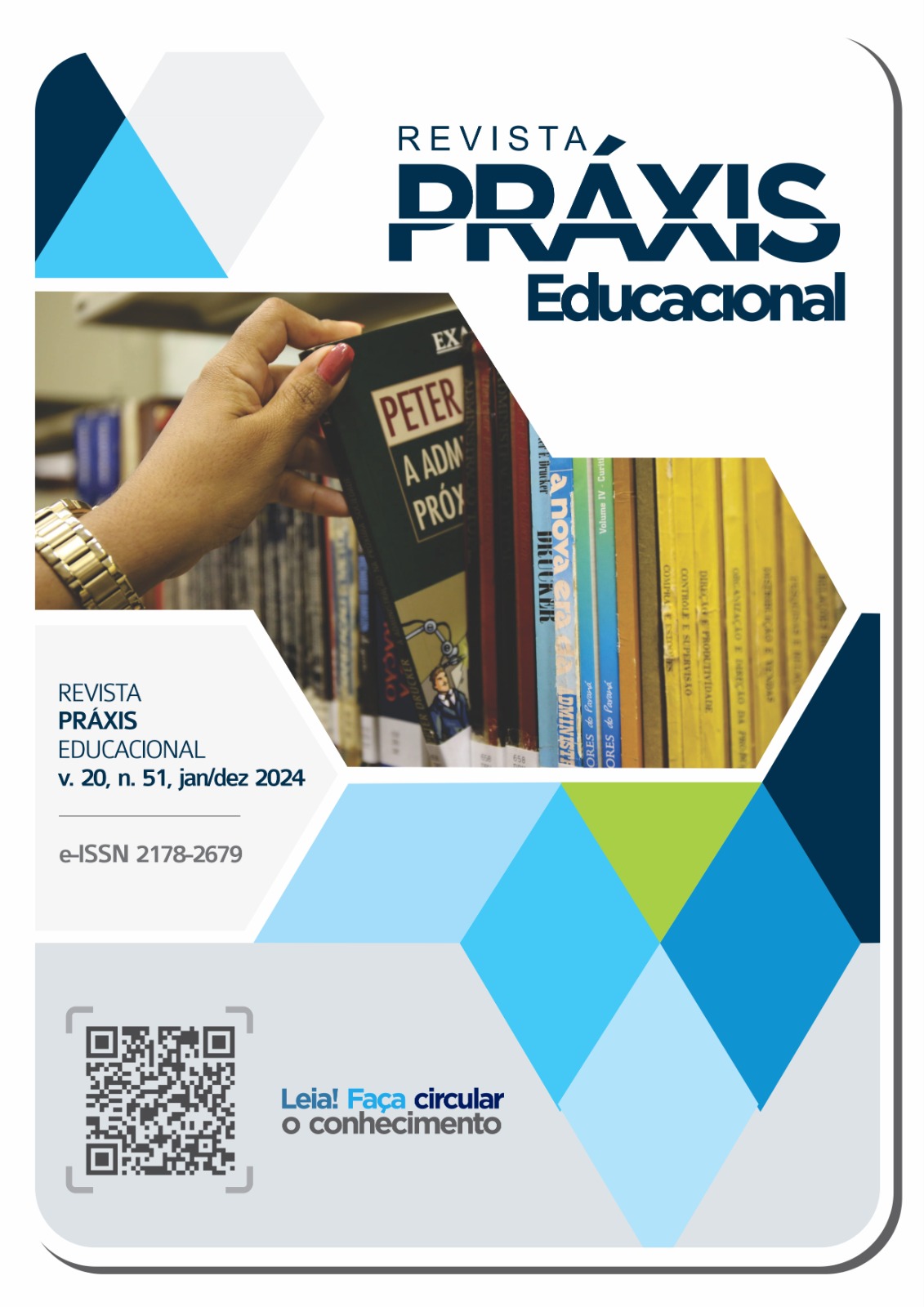Ludicity: concepts, paradigms and conceptions in higher education
DOI:
https://doi.org/10.22481/praxisedu.v20i51.13947Keywords:
conceptions, paradigms, ludicity, higher educationAbstract
The article argues about ludicity in higher education, exposes concepts, proposes paradigms and conceptions to allow lucidity’s comprehension far beyond common sense. Its main objective is to comprehend ludicity according to its paradigms and conceptions; and the specific objectives are to recognize paradigms to the lucidity’s comprehension; rise conceptions of the ludicity; and identify the prevalent lucidity’s conception in higher education. The methodological path is supported by a qualitative approach executed by instrumental case study accomplished in a public university, with higher education’s accounting students’ collaboration. The data was produced by mixed questionnaire and focus group; its results were triangulated and comprehended by content analysis by categories. It was concluded that there are two paradigms: the Total Ludic and the Real Ludic, as well as it was raised up the following lucidity’s conceptions: Subjective, Utilitarian (with two strands: didactic and productive), Infantile and Entertainment. The Utilitarian Conception was prevalent, maybe because of the pragmatic identity of the course investigated.
Downloads
Metrics
References
ALMEIDA, Paulo Nunes de. Educação lúdica. 1 ed. Petrópolis: Loyola, 2013.
BARDIN, Laurence. Análise de Conteúdo. 1 ed. São Paulo: Edições 70, 2011.
CABANAS, Edgar; ILLOUZ, Eva. Happycracia. 1 ed. São Paulo: Ubu, 2022.
CSIKSZENTMIHALYI, Mihaly. Descoberta Do Fluxo. 1 ed. São Paulo: Rocco, 1999.
FERRAZ, Rita de Cássia S. N.; FERREIRA, Lúcia Gracia. Vivência e ludicidade: dialogando com a formação docente? Revista Educação em Páginas, v. 1, n. 27, p. 1-15, 2022.
FERREIRA, Lúcia Gracia. Desenvolvimento Profissional e Carreira Docente Brasileira: Interseções e diálogos com professores da Educação Básica. 1 ed. Campinas: Pontes, 2023.
FORTUNA, Tânia R. Sala de aula é lugar de brincar? In: ZEN, Maria Isabel H. Dalla; XAVIER, Maria Luisa M. (org.). Planejamento em destaque: análises menos convencionais. 2 ed. Porto Alegre: Editora Mediação, 2000. p. 147–164.
GUBA, Egon G.; LINCOLN, Yvonna S. Controvérsias paradigmáticas, contradições e confluências emergentes. In: DENZIN, Norman K.; LINCOLN, Yvonna S. (org.). O Planejamento Da Pesquisa Qualitativa. 2 ed. Porto Alegre: Penso, 2006. p. 169–192.
GUIMARÃES, Rafaela S.; FERREIRA, Lúcia Gracia. Formação potencialmente lúdica : um diálogo possível com a educação. Revista de Estudos Universitários, v. 48, p.1-29, 2022.
HAN, Byung-Chul. Psicopolítica. 1 ed. Belo Horizonte: Editora Âyiné, 2020.
HAN, Byung-Chul. Sociedade do cansaço. 1 ed. Petrópolis: Vozes, 2017.
HUIZINGA, Johan. Homo ludens. 1 ed. Rio de Janeiro: Perspectiva, 1971.
KISHIMOTO, Tizuko. O brincar e suas teorias. 1 ed. São Paulo: Pioneira, 1998.
LAVAL, Christian. A escola não é uma empresa: o neoliberalismo em ataque ao ensino público. São Paulo: Boitempo, 2019.
LEAL, Luiz Antonio Batista; D’ÁVILA, Cristina Maria. A ludicidade como princípio formativo. Interfaces Científicas - Educação, v. 1, n. 2, p. 41–52, 2013.
LLOSA, Mario Vargas. A civilização do espetáculo: Uma radiografia do nosso tempo e da nossa cultura. 1 ed. Rio de Janeiro: Objetiva, 2013.
LOPES, Conceição. Ludicidade humana: Contributo para a busca dos sentidos do Humano. Arveiro: Universidade de Aveiro, 2004.
LUCKESI, Cipriano. Ludicidade e atividades lúdicas na prática educativa: compreensões conceituais de proposições. 1 ed. São Paulo: Cortez, 2022.
MENDES, David; FONSECA, Ana Carolina Pimentel Duarte; SAUERBRONN, Fernanda Filgueiras. Modos de ideologia e de colonialidade em materiais didáticos de Contabilidade. Education Policy Analysis Archives, v. 28, n. 99, p. 1–42, 2020.
MINEIRO, Márcia. O essencial é invisível aos olhos: a concepção dos estudantes sobre a mediação didática lúdica na educação superior. 2021. Tese (Doutorado em Educação) - Faculdade de Educação, Universidade Federal da Bahia, Salvador, 2021.
MINEIRO, Márcia; D’ÁVILA, Cristina. Construindo Pontes: A Mediação Didática Lúdica no Ensino Superior. Práxis Educacional, v. 16, n. 37, p. 146–172, 2020.
MINEIRO, Márcia; SILVA, Mara A. Alves da; FERREIRA, Lúcia Gracia. Pesquisa Qualitativa e Quantitativa: imbricação de múltiplos e complexos fatores das abordagens investigativas. Momento - Diálogos em Educação, v. 31, n. 03, p. 201–218, 2022.
NEGRINE, Airton. A ludicidade como ciência. In: SANTOS, Santa Marli Pires dos (org.). A Ludicidade Como Ciência. 1. ed. Petrópolis: Vozes, 2001, p. 23–44.
OLIVEIRA, Josefa Kelly Cavalcante de; PIMENTEL, Fernando Silvio Cavalcante. Epistemologias da Gamificação na Educação: Teorias de Aprendizagem em Evidência. Revista da FAEEBA - Educação e Contemporaneidade, v. 29, n. 57, p. 236–250, 2020.
PICH, Roberto Hofmeister. Thomas Reid sobre Concepção, Percepção e relação mente-mundo exterior. Veritas, v. 55, n. 2, p. 144–175, 2010.
PIMENTEL, Mariano; CARVALHO, Felipe. Gamificação promove o engajamento nas situações de aprendizagem? In: D’ÁVILA, Cristina; CANDA, Cilene N.; ZEN, Giovana Cristina (org.). A Lira do brincar: a ludicidade da educação infantil à educação universitária. 1 ed. Curitiba: CRV, 2022. p. 185–217.
REID, Thomas. Essays on the Intellectual Powers of Man. Cambridge: Bookseller, 1852.
RETONDAR, Jeferson. Teoria do jogo. 1 ed. Petrópolis: Vozes, 2007.
SOARES, Ilma Maria Fernandes; PORTO, Bernadete de Souza. Se der a gente brinca: crenças das professoras sobre ludicidade e atividades lúdicas. Revista da FAEEBA - Educação e Contemporaneidade, v. 15, n. 25, p. 55–77, 2006.
STAKE, Robert E. Investigación con estudio de casos. 1 ed. Madrid: Morata, 1998.
Downloads
Published
How to Cite
Issue
Section
License
Copyright (c) 2024 Práxis Educacional

This work is licensed under a Creative Commons Attribution 4.0 International License.
You are free to:
Share - copy and redistribute the material in any medium or format; Adapt - remix, transform, and build from the material for any purpose, even commercially. This license is acceptable for Free Cultural Works. The licensor cannot revoke these freedoms as long as you follow the terms of the license.
Under the following terms:
Attribution - You must appropriately give credit, provide a link to the license, and indicate if any changes have been made. You may do so in any reasonable way, but not in a way that suggests that you or your use is endorsed by the licensor.
There are no additional restrictions - You cannot apply legal terms or technological measures that legally restrict others to make any use permitted by the license.










